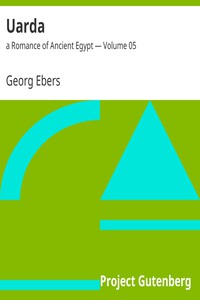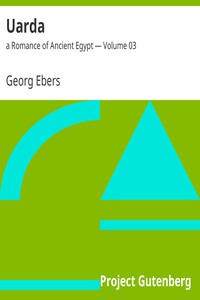Uarda : a Romance of Ancient Egypt — Volume 05 by Georg Ebers (e books free to read .txt) 📖

- Author: Georg Ebers
Book online «Uarda : a Romance of Ancient Egypt — Volume 05 by Georg Ebers (e books free to read .txt) 📖». Author Georg Ebers
"Not I—never!" said Nefert.
"You are just a rose—my dearest," said Bent-Anat. "Well! when I was fifteen I was so discontented, so insubordinate and full of all sorts of wild behavior, so dissatisfied in spite of all the kindness and love that surrounded me—but I will tell you what happened. It is four years ago, shortly before your wedding with Mena; my father called me to play draughts.
[At Medinet Habu a picture represents Rameses the Third, not Rameses the Second, playing at draughts with his daughter.]
You know how certainly he could beat the most skilful antagonist; but that day his thoughts were wandering, and I won the game twice following. Full of insolent delight, I jumped up and kissed his great handsome forehead, and cried 'The sublime God, the hero, under whose feet the strange nations writhe, to whom the priests and the people pray—is beaten by a girl!' He smiled gently, and answered 'The Lords of Heaven are often outdone by the Ladies, and Necheb, the lady of victory, is a woman. Then he grew graver, and said: 'You call me a God, my child, but in this only do I feel truly godlike, that at every moment I strive to the utmost to prove myself useful by my labors; here restraining, there promoting, as is needful. Godlike I can never be but by doing or producing something great! These words, Nefert, fell like seeds in my soul. At last I knew what it was that was wanting to me; and when, a few weeks later, my father and your husband took the field with a hundred thousand fighting men, I resolved to be worthy of my godlike father, and in my little circle to be of use too! You do not know all that is done in the houses behind there, under my direction. Three hundred girls spin pure flax, and weave it into bands of linen for the wounds of the soldiers; numbers of children, and old women, gather plants on the mountains, and others sort them according to the instructions of a physician; in the kitchens no banquets are prepared, but fruits are preserved in sugar for the loved ones, and the sick in the camp. Joints of meat are salted, dried, and smoked for the army on its march through the desert. The butler no longer thinks of drinking-bouts, but brings me wine in great stone jars; we pour it into well-closed skins for the soldiers, and the best sorts we put into strong flasks, carefully sealed with pitch, that they may perform the journey uninjured, and warm and rejoice the hearts of our heroes. All that, and much more, I manage and arrange, and my days pass in hard work. The Gods send me no bright visions in the night, for after utter fatigue—I sleep soundly. But I know that I am of use. I can hold my head proudly, because in some degree I resemble my great father; and if the king thinks of me at all I know he can rejoice in the doings of his child. That is the end of it, Nefert—and I only say, Come and join me, work with me, prove yourself of use, and compel Mena to think of his wife, not with affection only, but with pride." Nefert let her head sink slowly on Bent-Anat's bosom, threw her arms round her neck, and wept like a child. At last she composed herself and said humbly:
"Take me to school, and teach me to be useful." "I knew," said the princess smiling, "that you only needed a guiding hand. Believe me, you will soon learn to couple content and longing. But now hear this! At present go home to your mother, for it is late; and meet her lovingly, for that is the will of the Gods. To-morrow morning I will go to see you, and beg Katuti to let you come to me as companion in the place of my lost friend. The day after to-morrow you will come to me in the palace. You can live in the rooms of my departed friend and begin, as she had done, to help me in my work. May these hours be blest to you!"
CHAPTER XXII.At the time of this conversation the leech Nebsecht still lingered in front of the hovel of the paraschites, and waited with growing impatience for the old man's return.
At first he trembled for him; then he entirely forgot the danger into which he had thrown him, and only hoped for the fulfilment of his desires, and for wonderful revelations through his investigations of the human heart.
For some minutes he gave himself up to scientific considerations; but he became more and more agitated by anxiety for the paraschites, and by the exciting vicinity of Uarda.
For hours he had been alone with her, for her father and grandmother could no longer stop away from their occupations. The former must go to escort prisoners of war to Hermonthis, and the old woman, since her granddaughter had been old enough to undertake the small duties of the household, had been one of the wailing-women, who, with hair all dishevelled, accompanied the corpse on its way to the grave, weeping, and lamenting, and casting Nile-mud on their forehead and breast. Uarda still lay, when the sun was sinking, in front of the hut.
She looked weary and pale. Her long hair had come undone, and once more got entangled with the straw of her humble couch. If Nebsecht went near her to feel her pulse or to speak to her she carefully turned her face from him.
Nevertheless when the sun disappeared behind the rocks he bent over her once more, and said:
"It is growing cool; shall I carry you indoors?"
"Let me alone," she said crossly. "I am hot, keep farther away. I am no longer ill, and could go indoors by myself if I wished; but grandmother will be here directly."
Nebsecht rose, and sat down on a hen-coop that was some paces from Uarda, and asked stammering, "Shall I go farther off?"
"Do as you please," she answered. "You are not kind," he said sadly.
"You sit looking at me," said Uarda, "I cannot bear it; and I am uneasy —for grandfather was quite different this morning from his usual self, and talked strangely about dying, and about the great price that was asked of him for curing me. Then he begged me never to forget him, and was so excited and so strange. He is so long away; I wish he were here, with me."
And with these words Uarda began to cry silently. A nameless anxiety for the paraschites seized Nebsecht, and it struck him to the heart that he had demanded a human life in return for the mere fulfilment of a duty. He knew the law well enough, and knew that the old man would be compelled without respite or delay to empty the cup of poison if he were found guilty of the theft of a human heart.
It was dark: Uarda ceased weeping and said to the surgeon:
"Can it be possible that he has gone into the city to borrow the great sum of money that thou—or thy temple—demanded for thy medicine? But there is the princess's golden bracelet, and half of father's prize, and in the chest two years' wages that grandmother had earned by wailing lie untouched. Is all that not enough?"
The girl's last question was full of resentment and reproach, and Nebsecht, whose perfect sincerity was part of his very being, was silent, as he would not venture to say yes. He had asked more in return for his help than gold or silver. Now he remembered Pentaur's warning, and when the jackals began to bark he took up the fire-stick,
[The hieroglyphic sign Sam seems to me to represent the wooden stick used to produce fire (as among some savage tribes) by rapid friction in a hollow piece of wood.]
and lighted some fuel that was lying ready. Then he asked himself what Uarda's fate would be without her grandparents, and a strange plan which had floated vaguely before him for some hours, began now to take a distinct outline and intelligible form. He determined if the old man did not return to ask the kolchytes or embalmers to admit him into their guild—and for the sake of his adroitness they were not likely to refuse him—then he would make Uarda his wife, and live apart from the world, for her, for his studies, and for his new calling, in which he hoped to learn a great deal. What did he care for comfort and proprieties, for recognition from his fellow-men, and a superior position!
He could hope to advance more quickly along the new stony path than on the old beaten track. The impulse to communicate his acquired knowledge to others he did not feel. Knowledge in itself amply satisfied him, and be thought no more of his ties to the House of Seti. For three whole days he had not changed his garments, no razor had touched his chin or his scalp, not a drop of water had wetted his hands or his feet. He felt half bewildered and almost as if he had already become an embalmer, nay even a paraschites, one of the most despised of human beings. This self- degradation had an infinite charm, for it brought him down to the level of Uarda, and she, lying near him, sick and anxious, with her dishevelled hair, exactly suited the future which he painted to himself.
"Do you hear nothing?" Uarda asked suddenly. He listened. In the valley there was a barking of dogs, and soon the paraschites and his wife appeared, and, at the door of their hut, took leave of old Hekt, who had met them on her return from Thebes.
"You have been gone a long time," cried Uarda, when her grandmother once more stood before her. "I have been so frightened."
"The doctor was with you," said the old woman going into the house to prepare their simple meal, while the paraschites knelt down by his granddaughter, and caressed her tenderly, but yet with respect, as if he were her faithful servant rather than her blood-relation.
Then he rose, and gave to Nebsecht, who was trembling with excitement, the bag of coarse linen which he was in the habit of carrying tied to him by a narrow belt.
"The heart is in that," he whispered to the leech; "take it out, and give me back the bag, for my knife is in it, and I want it."
Nebsecht took the heart out of the covering with trembling hands and laid it carefully down. Then he felt in the breast of his dress, and going up to the paraschites he whispered:
"Here, take the writing, hang it round your neck, and when you die I will have the book of scripture wrapped up in your mummy cloths like a great man. But that is not enough. The property that I inherited is in the hands of my brother, who is a good man of business, and I have not touched the interest for ten years. I will send it to you, and you and your wife shall enjoy an old age free from care."
"The paraschites had taken the little bag with the strip of papyrus, and heard the leech to the end. Then he turned from him saying: "Keep thy money; we are quits. That is if the child gets well," he added humbly.
"She is already half cured," stammered Nebsecht. "But why will you—why won't you accept—"
"Because till to day I have never begged nor borrowed," said the paraschites, "and I will not begin in my old age. Life for life. But what I have done this day not Rameses with all his treasure could repay."
Nebsecht looked down, and knew not how to answer the old man.
His wife now came out; she set a bowl of lentils that she had hastily warmed
 Have you ever thought about what fiction is? Probably, such a question may seem surprising: and so everything is clear. Every person throughout his life has to repeatedly create the works he needs for specific purposes - statements, autobiographies, dictations - using not gypsum or clay, not musical notes, not paints, but just a word. At the same time, almost every person will be very surprised if he is told that he thereby created a work of fiction, which is very different from visual art, music and sculpture making. However, everyone understands that a student's essay or dictation is fundamentally different from novels, short stories, news that are created by professional writers. In the works of professionals there is the most important difference - excogitation. But, oddly enough, in a school literature course, you don’t realize the full power of fiction. So using our website in your free time discover fiction for yourself.
Have you ever thought about what fiction is? Probably, such a question may seem surprising: and so everything is clear. Every person throughout his life has to repeatedly create the works he needs for specific purposes - statements, autobiographies, dictations - using not gypsum or clay, not musical notes, not paints, but just a word. At the same time, almost every person will be very surprised if he is told that he thereby created a work of fiction, which is very different from visual art, music and sculpture making. However, everyone understands that a student's essay or dictation is fundamentally different from novels, short stories, news that are created by professional writers. In the works of professionals there is the most important difference - excogitation. But, oddly enough, in a school literature course, you don’t realize the full power of fiction. So using our website in your free time discover fiction for yourself. 




Comments (0)